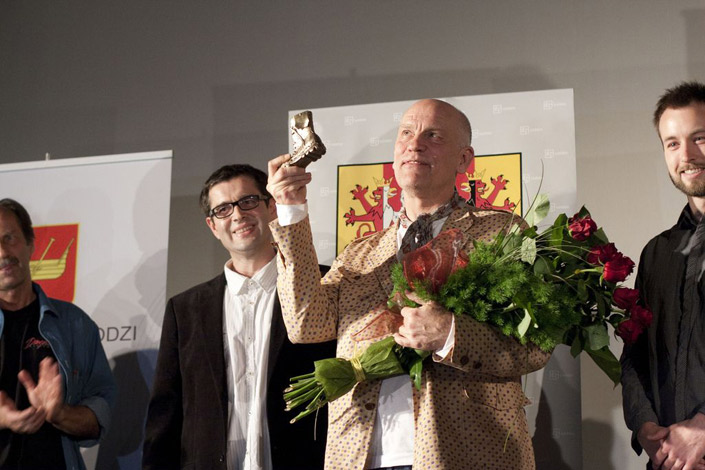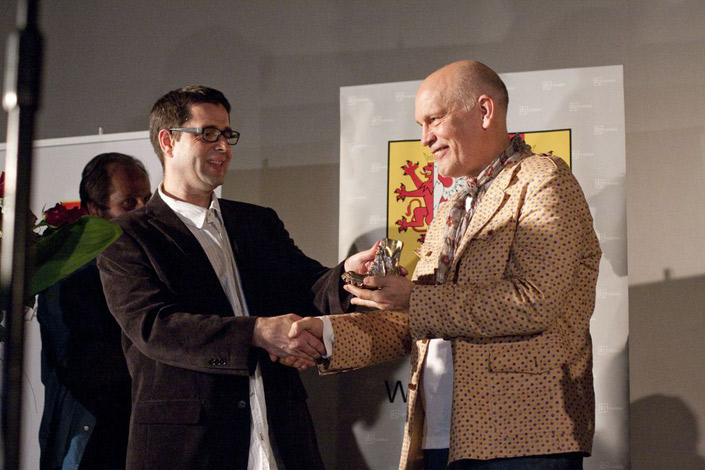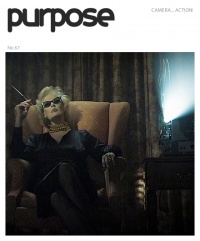
Interview
Fast ride without popcorn
Let's start by asking why are you at work on Sunday? And why do you work on Sunday? Why are we doing this?
It's the matter of character and doing something on your own, in your own way without looking at the others. We want to risk, we're not afraid. We learn at the same time, come to perfection, to be better and better, more effective. However it's the matter of doing things with passion. I think that's the beginning. Without the passion it's hard to talk about something we do for twelve, fourteen hours a day including Saturday and Sunday.
What about your family?
In general, everyone thinks I'm crazy. It's not normal to devote so much time on work. But my family understand me. Without family's support one would work much worse. Family tolerates my absence because they know I do what I like doing.
What does your wife do?
She's an architect, she works flexible hours. As she dealt with many lunatics, she has many artists friends. She was one of the first muses of Łódź Kaliska, they've been friends for 30 years. So she understands this state of mind which is stressed at all times and strives for more experiences, and at the same time for creating new reality - I guess that's what we care about, we want to change something. We want to change our surroundings, we want to change... the world. No, it's too big, we aren't revolutionists. Though in our own area, in some narrow scope, we undertake to fight, we bit off more than we can chew.
Is your work profitable? You do what you do, you devote your time. Is this a business?
I try to make it business, I try to change different intellectual projections into money, so that some author's values would bring such a profit so that I could make a living. But as we know, in the artistic world - and the activity I do is one the edge of business and art - it doesn't always come out the way it should. One in a hundred painters gains fame and becomes well prosperous artist. Others in order to survive do things they don't want to do. I think I'm one of those people who don't know words “it cannot be done” or “impossible” and I keep trying, at least I try to do as much as I can with my skills, competence, knowledge. I believe there aren't things that cannot be done. Of course it requires many elements, and money is one of them. Right. I suppose the family wouldn't accept what you do if it didn't make sense in terms of finances.
Would your wife be as understanding if you didn't give money?
There were times when i didn't give any money and my wife worked to keep the house. I try to be realistic and at least cover the costs of participating in family, as much as my finances allow me to. It's not something that would let me to save some money, to go for a journey around the world - to enjoy life and have a lot of free time when you need it. I work round the clock, I haven't had more than four weekend days free in the last two years, no holidays.
You like what you do, so it's not a problem for you, is it?
Well, it is a problem because after twenty years of showing that something can be done effectively, with a success - at least in our spectators' opinion, whom we convinced with our offer and events we organize. One may think that position of someone whose output is quite large should be noticed. Especially among those institutions or officials that have public means, because the cinema is a public place, and everything we do, we do for culture to build film culture in Łódź and Poland.

John Malkovich with Złoty Glan
I always try to talk for all of us because even though I impose a vision and coordinate and manage different projects I'm aware that without my co-workers - people I encourage to this kind of craziness it would be difficult to accomplish them alone. Cinema is a team work.
You say you need public money for your activities. How's your cinema different from the one that needs public money, but also works commercially (because you sell tickets) from the activity of let's say Silver Screen or other cinema chains which work on commercial basis alone?
Charlie is an author's project, so it's a meaningful, distinctive offer. But it's hard to say we can aspire to large foreign capital which builds a net, has funds for promotion and through such activity influences the market. What we achieve - in the field of cinema - is more of an intellectual offer which allows to create market of supporters. We develop business by building our permanent audience instead of producing things we know would sell. Our vision is rather convergent with educational activity of some kind, with vision of building certain values - based on film, not just on making money. Of course its our aim to make our intellectual offer the element which creates the capital that makes us think about creating Charlie cinema chain as an alternative for commercial market. Most of our repertoire - check our website - comprises of artistic, niche, studio films and they have smaller audience which keeps the same level. Actually you can observe the audience feeling the need to watch such movies is getting smaller and smaller. By our activity we try to enlarge the circle of recipients, we try to reach people who haven't been in the cinema before or haven't felt the need to go there.
Can you compare the activity of Charlie cinema to this tendency which is created in media and produce theme channels directed to particular client.
It's similar. But the cinema is a place for total interaction on different levels and it's hard to say that Charlie is the cinema of just artistic, experimental or drama films. We try to do the research, experiment, look for the audience and new topics, new offers. We enter into parts of culture which is underground, and suddenly after it's brought into daylight by projection or realization of some event it gets official or visible. Many of our projects is connected with subcultures or for example skate movies about skateboarders have their own quite a big audience. And by reaching niches, looking for them you can earn money.
Does your client know that this product is selected to be of the best quality when they come to your cinema?
Definitely.
So they get the best quality culture product...
Or a product they can discuss about, which is an important voice in the discussion on identity of European cinematography (like qeer theme). We're not afraid of any topics, we break all of the stereotypes. We don't try to be popular, it's rather acting to confront our feelings, impressions, knowledge about the world and to present it as an offer for our audience that buys it or not.
I'm interested in the source of your income...
Tickets mainly, of course.
And the second source is public money, which means our money, though disposed of by different bodies. Are those bodies ready to give you money for the product, service to entrust you with public means?
If you want it loud and clear I say no. It's very often chaotic, accidental and puts the ambitious animators into danger of disappointment and dilemmas because there's no logic in granting public means. It's very complicated and you can't be sure that your offer you think is perfect or pioneering - like “Kino na cenzurowanym” - will encounter officials' positive reaction. It's often a struggle to realize our idea in as realistic way as possible for minimal amount of money.
You create high quality culture product which is exposed on the market. So why taking care of such product if you could...
Now, we're getting back to the beginning, to person's character, the manager having a vision that he wants to accomplish. I've never been interested in things I explored before. I always tried to discover something new for myself, and by the way pass it to others as an offer of Charlie cinema, because building value is the basis of my thinking about the art and culture. You can't limit yourself to offers. They can be institutions which can come up with something, which can have an intellectual adventure. For me cinema is an intellectual adventure. Cinema as a place of presentation, events, management, place where all kinds of social problems meet, often political, philosophical or artistic visions. Cinema as a place which operates at the edge of institution, state, private company, rich spectators, poor, those who feel the need to watch valuable films and those who want to present such offer, and in the form of film education offer it to young people like teachers. Cinema is boiling at all times and i want to keep it boiling, it cannot stagnate - it must be under construction.
Tell me about your most ambitious project which you reactivated two years ago and it boils and will boil over in the form of an event. How did it begin?
It began almost twenty years ago. European Cinema Forum began as an inspiration of spectators. I was working in Przedwiośnie cinema, and I was organizing many interesting things: Monthy Python Festival, German Cinema Retrospective and I managed to gain loyal audience. It was the first year in which there wasn't Film Confrontation and in some way talking to the spectators I was inspired to create in Łódź my own film event of a size of Warsaw Film Festival, and I did so.

John Malkovich with Złoty Glan
From the very beginning it was a film and interdisciplinary event. Apart from presenting films I've always tried to prepare side events carefully. They were fashion shows, concerts, workshops, masterclass in School Film or exhibitions. Last year was the closest to particular vision of this event. We should remember that due to economical reasons it hasn't been organized for frour years. It was the reason for Charlie cinema collapse, breakdown and our failures, but it's an important element of film culture which is inscribed into Film Łódź strategy. Last year was as difficult, mainly because lack of cooperation from one office... By the way, to organize such a festival, with this profile, is the only offer in Poland and if there were people willing to do it well then I don't see any problems to make more of events like that. But I'm afraid nobody is willing to work so hard to come up with something original and at the same time do it at the same time and place, prepare from the media side, logistic.
So, it's a new event with traditions.
Definitely the shape is new because this year we've quit the retrospective and replaced it with the contest, that's why European Cinema Forum has it's own name Cingeria, and that's why we have an international jury and foreign visitors. That's the way we realize this event which was invented and effectively organized through the firs decade and we want to come back to this tradition because we know that at the moment there's no alternative in Łódź. For the first time in the last year's Forum in the contest of Kryształowa Łódka and 10 000 Euro for the best European debut several films of young directors from Norway, Turkey, Slovakia, Italy, Czech Republic, Hungary, Spain and others participated.
Their films were judged by international jury comprising of Marta Meszaros, Dean Jakubiskova, Jacek Szumlas, professor Ewa Nowina-Sroczyńska, Krzysztof Ptak, Łukasz Dzięcioł, Paweł Borowski. The main prize of Kryształowa Łódka for the best debut went to Belgian director Peter van Leeuw for "Dzień, w którym odszedł Bóg". Jury's special prize went to Spain for debut "Ja też" directed by Antonio Navarro and Pablo Pastor. The audience gave the prize to Irish-Dutch film by Urszula Antoniak "Nic osobistego", and hre new film "Blue Code" was widely discussed at last New Horizons. Debutants' films were clashed with European masters of cinema. Films of Marta Meszaros including the newest which settles with collaborationist past of Hungary "Ostatni raport Anny", and Juraj Jakubisko with his earlier, less recognized pictures, and Otar Joseliani with nostalgic, well accepted in Cannes "Chantrapas" were presented. Retrospectives also had some younger films of experienced authors like Jan Hrebejk, Bent Hamer and Jaco van Dormael, Belgian director, author of famous "Mr. Nowbody" creation of which took him 10 years of his life. Jaco van Dormael, Marta Meszaros, Otar Josseliani, Deana Jakubiskova (to replace her sick husband Juraj), Tinto Brass, Caterina and Vincenzo Varzi , Nina Adresen-Borud, Daniel Olbrychski, Małgorzata Kożuchowska personally appeared on Forum. Our late visitor John Malkovich, who accepted our invitation, in cooperation with Marshall Office and Jaracz Theater came in June to end the cultural season, acted in play "The Infernal Comedy" and was awarded with "Złoty Glan" in Bałtyk Cinema.
Reactivation of contest for the Andrzej Munk prize will be organized with Film School in Łódź, which co-organizes the event with us. I don't want to tell everything just yet but I can tell two names. Istvan Szabo, European cinema master, amazing erudite and story-teller confirmed his presence at European Cinema Forum. The second person is Gary Lucas, appreciated American guitarist, member of Gods and Monsters, long term co-worker of Jeff Buckley with whom he recorded the album "Songs To No One". Lucas is the author of Buckley's greatest hits like "Grace" and "Mojo Pin". He also worked with other world stars like Nick Cave, Lou Reed, Chris Cornell or John Cale. Rolling Stone Magazine called him one of the best and original guitarists of America. He'll present his play "Spanish Dracula" at the end of Forum.
How's it organized? What Charlie cinema is responsible for?
Charlie cinema and Łódź Film Association, which I'm honored to be the president of, is the host and creator of the whole event beginning from the artistic and author's shape and finishing with logistics, copies transfer, accommodation for visitors. It's a huge venture.
Right. Do you have any partners? How many people work on it?
Don't ask me about things like that or we have to move back to the beginning of our conversation and say we bite off more than we can chew and the event is being prepared by so narrow group of people it's embarrassing to talk about it. I'll just give an example, smaller event in Reykjavik is being prepared by 25 people all year long. It's not a secret that two persons work on Forum, it's me and Mariola Wiktor. We only have a few co-workers and it's a heroic task when talking about the preparation of a national event, and we organize international event. Without at least the financial support this event wouldn't even exist because money is necessary to organize it and determine its shape. If we don't pay for the copies, licenses, subtitles on time or we wont pay for flight then the costs grow or eliminate a film or author from the offer. I think that if nothing changes in terms of cooperation, mainly with Marshall's Office in Łódź, it 'll be the last event in this shape in Łódź. Cooperation with Marshall's Office is not enough to implement such a big event.
You sell not only the product but also the image. You are active in Łódź so you sell the image of Łódź. When you're appreciated, get an award you promote Łódź.
Recently, I was given three awards at the same time. They were PISF award for the best cinema in Poland, our cinema was awarded the best cinema in Europe and we were given Province Marshall Witold Stępień's Award for the entirety of our cultural actions also those realizen in the region. In Łódź we organize many pro bono events. Our cinema is a proposal of working within the field of helping foundations, orphanages and so on. We realize whole range of non-commercial actions we know aren't profitable for us. It's our mission to promote valuable cinema and not hide behind the economical factor. We think that let's say MONAR environment should keep in touch with valuable cinema, and not just with the cinema of "hallucinations and vertigo". We want to be the intellectual adventure for our spectators and not just "fast ride" with popcorn in hand.
Maciej Mazerat talked with Sławomir Fijałkowski, the founder of Charlie Cinema in Łódź.
Check the archive

no 67 January 2013
theme of the issue:
CAMERA... ACTION!
< spis treści
Article
From editors
Interview
Fast ride without popcorn - interview with Sławomir Fijałkowski - Maciej Mazerant
Presentation
Directed by Jakub Czekaj
Analysis
Film and mimesis - Artur Zaguła
Career in Culture
The Internet gives freedom - interview with Dawid Marcinkowski, director of Sufferrosa - Daria Głowacka
Culture Industries
Idea is the most important - interview with Olgierd Cygan, the initiator of Filmteractive - Daria Domańczyk
On the Margin
X, y, z... - Agnieszka Furmańczyk





